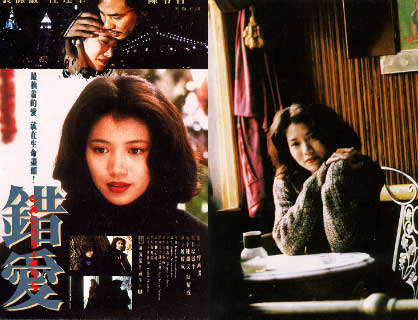Crossings

Reviewed by YTSL
In 1992, Evans Chan offered up what Paul Fonoroff
described as “possibly the boldest local feature film of the year” in the
form of the politics-infused, yet still rather personal feeling, “To Liv(e)”.
Although the director-scriptwriter’s debut work’s topical focus could be said
to have been on a series of letters written by a thoughtful plus articulate
Hong Kong resident -- named Rubie (and portrayed by Golden Horse Best Actress
winner, Lindzay Chan) -- to the Norwegian actress cum activist, Liv Ullman,
regarding the then British crown colony’s treatment of Vietnamese refugees,
another major theme running through it concerned the (pre-)Handover fears
of Hong Kongers; many of whom were contemplating leaving their home territory
rather than live under Communist rule after 1st July, 1997.

In his second film (one which, rather curiously, has Lindzay Chan once more
playing an empathy-exuding character named Rubie), Evans Chan appeared intent
on pointing out the high probability that his fellow Hong Kongers would hardly
be leaving all of their troubles behind, should they decide to venture out
of the “Fragrant Harbour” for pastures new (including far away North American
destinations like Toronto and New York). Perhaps it was a message that
was rather daring to communicate to a(n already) skittish community three
years before the Handover. At the same time, however, this 1994 effort’s
associated cautionary tale of ethnic Chinese people experiencing woes when
venturing beyond the East Asian space collectively known as “the Three Chinas”
that underlies CROSSINGS looks to be part of an all too familiar as well
as largely down-beat Hong Kong cinematic trope (whose most well known contemporary
example might be Clara Law’s infamously depressing “Farewell, China” but
could be said to also encompass Stanley Kwan’s “Full Moon in New York” and
Sylvia Chang’s “Siao Yu”).

Consequently, this (re)viewer didn’t find this Joyce Chan co-scripted drama
-- that is set in New York as well as, in flashbacks, Hong Kong -- to be
half as innovative, impressive or interesting as the first Evans Chan film
that she had checked out. And while the choice of Anita Yuen (as a
woman named Mo-Yung Yuen who had journeyed half way across the world in a
bid to be together once more with a man she had met and fallen in love with
in Hong Kong) and Simon Yam (whose Benny character had told Yuen that he
was a professional photographer but really was a drug smuggler) to head its
cast may have helped CROSSINGS at the local box office, it seemed to have
been at the expense of negatively mainstreaming the offering. Furthermore,
even though the character of Joey (who was played by Ted Brunetti) actually
was mentally disturbed -- as well as resentfully racist -- and Monica Ha’s
Mabel character was Asian-American rather than an out and out “gweilo”, it
surely was not an especially novel, never mind laudable, move on the part
of this multiply troubling movie’s maker(s) to have the production’s two
least admirable personalities be non-Hong Kongers.

At one point in CROSSINGS, one of the few individuals with a significant
amount of screen-time and dialogue in this offering snapped at a couple of
others to “Don’t be so melodramatic”. For the record: At the quite
late stage in the Jamie Silverstein lensed effort that she uttered this rather
telling as well as dismissive sounding, line, its main character had been
revealed to have been made pregnant by a man who was involved in criminal
activities plus another woman, and another of the film’s female characters
already had to contend with being stalked for some time by a rather suspicious
as well as too intense looking stranger. As such, my sense was that,
whether or not the two people at whom Mabel directed those words acted upon
them, the movie itself had long gone past the point of being able to avoid
plunging deep into the emotional depths in which it ended up being thoroughly
immersed.

Some further idea of CROSSINGS’s angle and tone can be gained from another
of the work’s characters being told that “New York is full of vanished women”.
I don’t think it too much of a spoiler to disclose that among this unfortunate
group was the friend of Mo-Yung from whom Benny had learnt of the trusting
Hong Kong woman’s existence, and who had been the previous occupant of the
apartment in which Rubie -- who was no less a Hong Konger for her having
resided in New York longer, being a fluent English (with a strong British
accent) speaker and Eurasian looking -- now dwelled. By the same token,
and especially since it does get announced in the first few minutes of this
sadly disappointing work, here’s reporting too that one of its key disquieting
incidents has “a man...push[ing] a woman in front of a train.”

My rating for the film: 5.5
Note: The film was cut from 103 minutes to 92
minutes when it was released in theaters. At one time a video of the original
cut could be purchased from the director, but I am not sure if this is still
the case.






